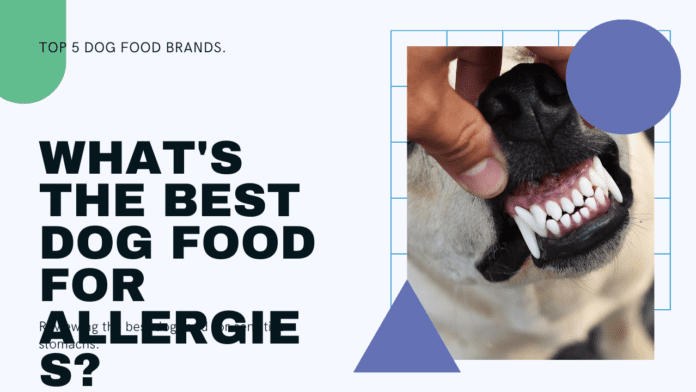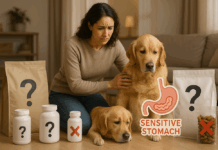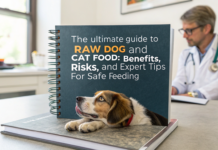Last Updated on April 5, 2024 by Dog Lover
What is the Best Dog Food for Allergies? Top 5 Brands Reviewed
Ever noticed your furry friend scratching incessantly, battling ear infections, or having constant digestive woes? It might not be just doggy drama; your pup could be suffering from dog food allergies.
Just like us humans, dogs can develop sensitivities to certain ingredients in their food, leading to a cascade of uncomfortable symptoms.
If you suspect your canine companion has allergies, a trip to the vet is your first step. They can perform diagnostic tests to identify the culprit ingredients and recommend a course of action.
Here’s where the hunt for the best dog food for allergies begins! But with a plethora of brands and confusing labels, navigating the world of hypoallergenic dog food can feel overwhelming.
Fear not, pet parents! This comprehensive guide will equip you with the knowledge to decipher dog food labels, explore top allergy-friendly brands, and ultimately find the perfect food to soothe your pup’s sensitive tummy and itchy skin.

Understanding Dog Food Allergies
Canine food allergies are similar to human allergies. When a dog ingests an ingredient they’re sensitive to, their immune system goes into overdrive, mistaking the protein as a threat. This triggers the release of histamines, leading to a range of inflammatory reactions.
Common signs of dog food allergies include:
- Itchy skin, redness, and inflammation
- Excessive scratching, licking, and chewing
- Hair loss
- Ear infections
- Vomiting
- Diarrhea
- Gas
Identifying the Allergen:
The most common food allergens in dogs are:
- Protein sources: Beef, chicken, dairy, eggs, and soy are the most frequent culprits.
- Grains: Wheat, corn, and gluten can trigger allergies in some dogs.
Diagnosing Dog Food Allergies:
Your veterinarian will likely recommend a food elimination trial to pinpoint the allergy-causing ingredient. This involves feeding your dog a special hypoallergenic diet for 8-12 weeks.
This diet usually contains a novel protein source, like venison, rabbit, or fish, that your dog hasn’t had before. If your pup’s symptoms improve on this diet, it suggests a food allergy. Once the allergen is identified, you can work with your vet to find a dog food that excludes it.

The Ultimate Guide to Hypoallergenic Dog Food
Now that you understand the allergy culprit, it’s time to delve into the world of hypoallergenic dog food.
Here are key factors to consider when choosing the best food for your dog’s allergies:
- Limited Ingredient Diets: These dog foods contain a single protein source and a limited number of carbohydrates, minimizing the risk of an allergic reaction.
- Novel Protein Sources: Look for dog foods featuring protein sources your dog hasn’t encountered before, like kangaroo, duck, or salmon.
- Hydrolyzed Protein Diets: These specialized diets break down protein molecules into smaller, less allergenic components. They’re often recommended by vets for severe allergies.
- Grain-Free Options: While not all dogs with allergies are sensitive to grains, opting for a grain-free formula can be beneficial in some cases.
Beyond the Label:
While the ingredients list is crucial, don’t neglect other factors like:
- Nutritional Completeness: Ensure the food meets all your dog’s nutritional needs for their age, breed, and activity level. Look for the AAFCO (Association of American Feed Control Officials) statement on the label.
- Quality Ingredients: Choose dog food made with high-quality, human-grade ingredients.
- Palatability: Your dog needs to enjoy their food! Look for brands with a variety of flavors and textures to keep your pup interested.

Top 5 Dog Food Brands for Allergies (Reviewed)
Here’s our curated list of the top 5 dog food brands for allergies, each offering unique benefits:
1. Royal Canin Veterinary Diets Hydrolyzed Protein
This veterinary-exclusive formula features hydrolyzed soy protein, a highly digestible and hypoallergenic protein source. It’s ideal for dogs with severe allergies or food sensitivities.
2. Hill’s Prescription Diet z/d
Hill’s z/d utilizes a single, novel protein source (often venison or duck) and limited carbohydrates, making it a great option for managing dog food allergies.
3. Purina Pro Plan FOCUS Sensitive Skin & Stomach
This readily available option from Purina offers a blend of salmon and rice, a common limited ingredient combination for dogs with allergies. It also contains prebiotics for digestive health.
4. Blue Buffalo Basics Limited Ingredient Diet
Blue Buffalo Basics Limited Ingredient Diet focuses on simple, limited-ingredient recipes. They offer various protein options like turkey, salmon, and lamb, alongside easily digestible carbohydrates like potatoes.
5. Taste of the Wild Limited Ingredient Diet
Taste of the Wild Limited Ingredient Diets come in a variety of novel protein options like venison, bison, and lamb. They also boast a blend of ancient grains like quinoa and chia seeds, alongside fruits and vegetables for added nutrients.
Choosing the Right Food for Your Dog
With so many allergy-friendly options available, selecting the perfect food for your dog can feel like finding a needle in a haystack. Here are some additional tips to guide you:
- Consult your veterinarian: They can assess your dog’s individual needs and recommend a suitable food based on the allergy test results and your dog’s overall health.
- Start slowly: When transitioning your dog to a new food, introduce it gradually over 7-10 days to avoid digestive upset.
- Monitor your dog: Closely observe your dog’s response to the new food. If their symptoms improve, you’re on the right track! If not, consult your vet for further guidance.
- Consider a holistic approach: While the right food is crucial, managing dog allergies may also involve additional measures like flea and tick control, managing environmental allergens, and using soothing shampoos for itchy skin.
Conclusion
Finding the best dog food for allergies requires detective work and a personalized approach.
By understanding your dog’s allergies, prioritizing high-quality ingredients, and consulting your vet, you can navigate the world of hypoallergenic dog food with confidence. Remember, a healthy diet is the foundation for a happy and itch-free pup!

Frequently Asked Questions (FAQs)
Can I treat my dog’s allergies with home-cooked meals?
Homemade diets can be a viable option for dogs with allergies, but it’s crucial to ensure they meet all your dog’s nutritional needs. Consult a veterinary nutritionist to create a balanced homemade recipe for your pup.
Are there any supplements that can help with dog allergies?
Omega-3 fatty acids like fish oil can have anti-inflammatory properties and may help alleviate itchy skin caused by allergies. Discuss supplementation with your veterinarian before introducing anything new to your dog’s diet.
How long will it take for my dog’s allergies to improve after switching food?
It typically takes 8-12 weeks for a dog’s symptoms to subside on a hypoallergenic diet. If you don’t see improvement after this timeframe, consult your vet to rule out other underlying causes.
What if my dog is allergic to multiple ingredients?
If your dog has sensitivities to several ingredients, a hydrolyzed protein diet might be the best option. These diets break down protein molecules into smaller, less allergenic components, making them less likely to trigger an allergic reaction.
How can I prevent dog food allergies?
There’s no guaranteed way to prevent allergies, but introducing a variety of protein sources early in your dog’s life may help. However, genetics play a significant role, so allergies can develop at any time.
Disclaimer: This information is for educational purposes only and should not be a substitute for professional veterinary advice. Always consult your veterinarian regarding your dog’s specific dietary needs and allergies.
Understanding Dog Food Allergies
- Link on canine food allergies: Canine food allergy | Merck Veterinary Manual: https://www.merckvetmanual.com/integumentary-system/food-allergy/cutaneous-food-allergy-in-animals
Diagnosing Dog Food Allergies
- Link on food elimination trials for dogs: Diagnosis of Food Allergies in Dogs | SAGE Journals: https://pubmed.ncbi.nlm.nih.gov/8407485/
The Ultimate Guide to Hypoallergenic Dog Food
- Link on AAFCO and pet food labeling: https://www.aafco.org/
Choosing the Right Food for Your Dog
- Link on transitioning dogs to new food: How to Transition Your Dog to a New Food | American Kennel Club: https://www.akc.org/expert-advice/nutrition/right-way-switch-dog-foods/
Frequently Asked Questions (FAQs)
- Link on omega-3 fatty acids for dogs: Fatty Acids for Dogs | VCA Animal Hospitals: https://vcahospitals.com/know-your-pet/fish-oil























